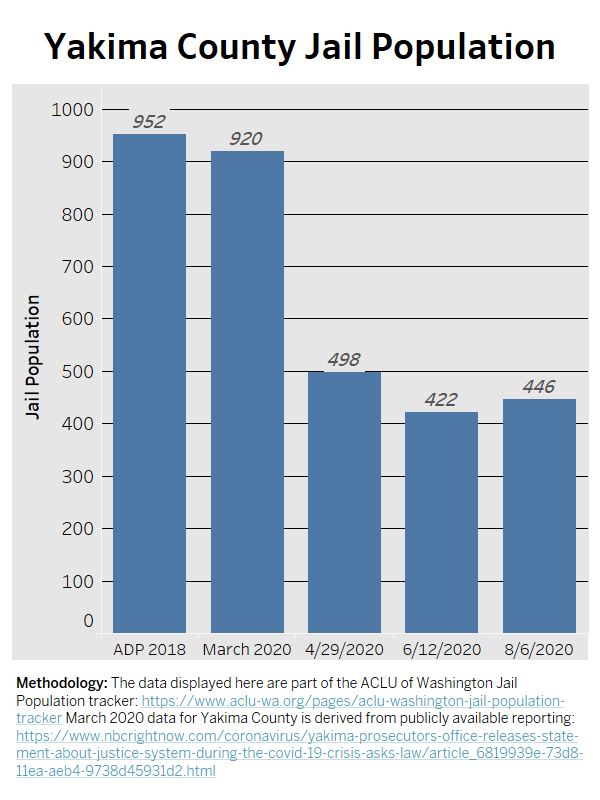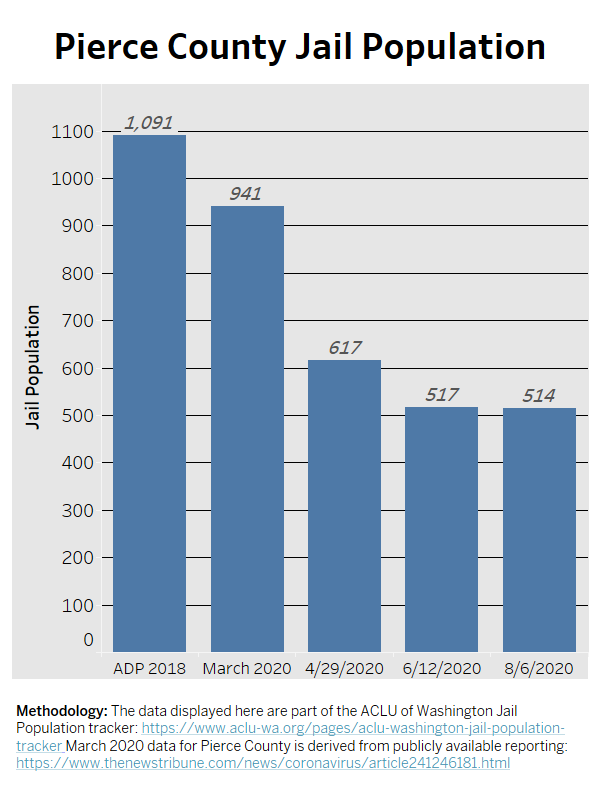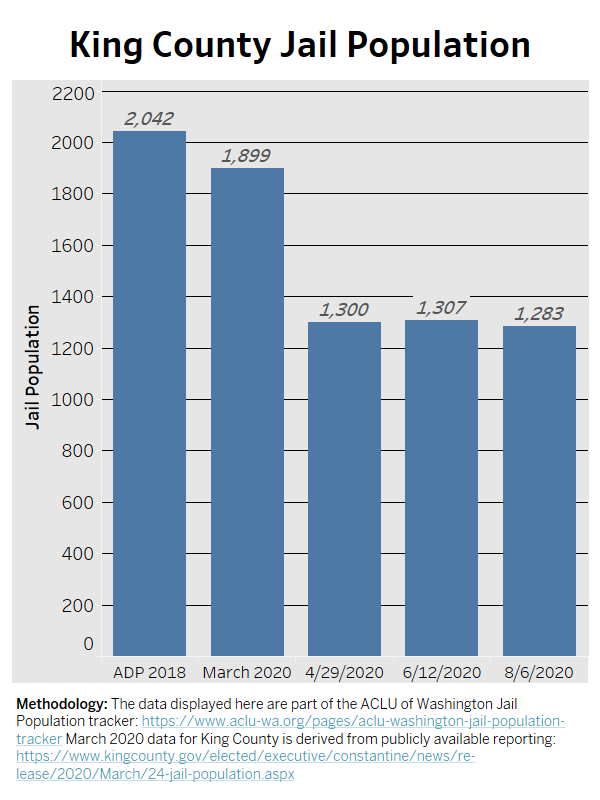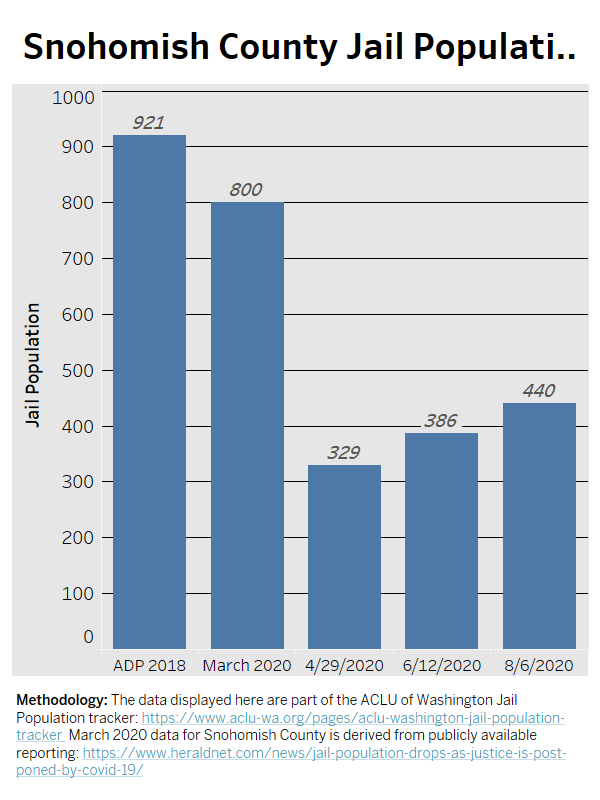Decarceration and the reimagining of the criminal legal system must continue. We cannot go back to business as usual and pre-COVID levels of mass incarceration, racial disparities, and overcrowded jails.
The ACLU of Washington has been tracking jail populations since the COVID-19 pandemic began. In response to the COVID-19 public health crisis:
- Washington’s overall statewide jail population was reduced initially by approximately 50%.
- Approximately 5,000 people were released between mid-March and early April 2020.
- Individual county jails reduced populations between 30-65%.
- The Yakima County and Pierce County jails both detained over 900 people in early March as COVID-19 began to spread in Washington, and both have maintained populations around 450-550 since May.


- In King County, over 1,900 people were detained in early March, and the population has been down to 1,300 over the past several months.

- The Snohomish County jail population decreased nearly 65% from 800 people to around 300 in mid-April, with a current population around 400.

Visit our jail population tracker to see jail population trends in Washington.
What led to these reductions? As COVID-19 hit Washington state, efforts were made by county system stakeholders to identify and release many of the elderly and medically vulnerable people with underlying health conditions. In response to agreed and contested motions for release, courts removed or lowered cash bail as a condition of release in many cases to decrease jail populations.
Northwest Public Radio has reported:
Before COVID-19, approximately 70 percent of those in Washington’s county jails were detained pretrial. Pre-trial detainees have not been convicted of a crime, are legally innocent, and are awaiting their trial dates. Locked in jail because they cannot afford the amount of bail set by the judge, they are at risk of losing their jobs, homes, and custody of their children. The pressure to plead guilty to get out of jail is especially significant with the spread of COVID-19 into our jails and prisons.
Counties put booking criteria and restrictions in place in response to COVID-19 to limit the flow of people into the jail and maintain population reductions. Additionally, some elected prosecutors have limited requests for bail and pretrial detention, and delayed filing new cases, which have helped limit the jail population.
How are these reductions made permanent? These restrictions and practices must be extended beyond the pandemic and should become permanent. Those accused of most misdemeanors and many felony offenses should not be booked into the jail. Only a very limited number of people accused of only the most serious offenses should be held until a judge makes a pretrial release decision. Prosecutors should implement bail and pretrial policies to restrict their detention requests accordingly. These past several months have shown that people facing charges can remain safely in the community while their case is pending in court.
Although it is too early to make conclusions about the effect of jail population reductions on crime rates, initial reports are promising. Since the increase in releases, preliminary evidence shows that crime rates are not up in Washington state communities. For example, in Spokane, “40% of the jail population was freed, and for months, the City’s crime rate stayed the same or dropped.” Similar results have been found in Seattle and in other large cities. Data on crime rates should be collected and analyzed by all counties, as well as the cost savings related to the jail releases.
Despite the significant reductions in the jail population, there are many more who should be released. Most people currently incarcerated in our jails have been waiting several months for their trial dates. Some are elderly, have medical issues, or are otherwise vulnerable to contracting COVID-19. Due to the pandemic, jury trials have been suspended for months and courts are struggling to set up safety protocols to reconvene jury pools and begin trials again. There will be a backlog of hundreds of criminal cases and trials for months to come, and there is great pressure to plead guilty to get out of jail in the midst of the pandemic’s uncertain circumstances and the fear of an outbreak in the jail. The extraordinary circumstances of this pandemic outbreak warrant further review of pretrial detention and the amount of bail imposed in hundreds of cases statewide.
The pandemic is far from over. There has been a recent outbreak in the Yakima County jail that infected nearly 31 percent of those detained and 34 corrections officers with COVID-19, more than 160 people. Also, in the Coyote Ridge Correctional Facility in Franklin County, more than 230 prisoners and 73 staff have been infected. Tragically, two prisoners and one staff member have died. The Washington State Penitentiary has 133 confirmed cases and the Monroe Correctional Complex has 62 cases. In the past month, at least 31 people incarcerated and 6 staff members have tested positive for COVID-19 in the Federal Detention Center in SeaTac. Jail and prison releases remain a public health necessity to prevent the spread of the novel coronavirus.
Responses to COVID-19 have taught us many lessons. They have shown what is possible and achieved many of the reforms we have been working toward for years. Thousands of people were released to the community from Washington jails in a few weeks. It should not take a public health crisis to expose the fact that Washington jails are full of people who should be released pretrial and that immediate steps can be taken to end mass incarceration.
Now is the time to contact city and county government officials and prosecutors to call for continued reductions to the jail population by permanently adopting more just policies and decarceration strategies.
The ACLU of Washington’s Smart Justice Campaign envisions a transformed criminal legal system that is smaller, free of bias and discrimination, rehabilitative, and committed to safe and healthy individuals and communities. It seeks to dismantle mass incarceration, eliminate racial disparities throughout the system, and significantly reduce the state’s incarcerated population in jails and prisons. We’re working to decriminalize offenses that need to be treated with public health approaches, end pretrial detention, and shorten prison time through comprehensive sentencing reform. We continue to work closely with allies and criminal legal system stakeholders statewide to advocate for additional reductions to jail and prison populations to stop the spread of COVID-19.




